Why An Armed Escort into Organ Pipe National Monument?
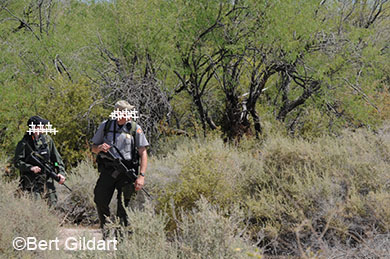
Armed Escort
©Bert Gildart: Was the trip Janie and I took in Organ Pipe National Monument in a van flanked by an armed escort to a closed section of the park known as Quitobaquito dangerous?
Nothing on our trip would lead us to believe that it was. However, upon completion of the half-day adventure one of the park naturalists scurried up to Janie and me and asked us if the photographs we took of park rangers with their M-16’s might be used in a magazine?
“Please,” she said, “though we think it would be OK, not everyone appreciates all our rangers are trying to do. We don’t want to jeopardize their lives in any way. If you intend to use them, please mask their faces.”
Obviously, that’s what we’ve done for the sake of this blog–and will do for a story I will soon be writing for the Affinity Group, which produces many publications to include Trailer Life and Motorhome. Not only did I place “+’s” over their faces, but I blurred the images–and did not use the closeup images I’d taken. Nevertheless, you can almost feel, I believe, the level of protection they’re providing our group of about 10. As we walked around the springs surrounded by dense vegetation, the rangers preceded us, checking the trail for tracks and for the actual presence of illegals.
The question, of course, is why is all this necessary?
“IT’S PROBABLY AN OVERKILL”
The park is launching a pilot project, trying to open portions of the park that have been closed since 2002, when Ranger Kris Eggle was savagely killed by a drug lord. “If one of our visitors were harmed,” said Superintendent Lee Baiza, who graciously gave me a few minutes of his time yesterday afternoon, ” it could ruin this park.”
Still Superintendent Baiza wants to reopen sections of this park that have been closed and he obviously thinks the time is right–that essentially it is safe. “It’s probably an overkill,” said Baiza, “but we just don’t want to leave anything open to chance.”
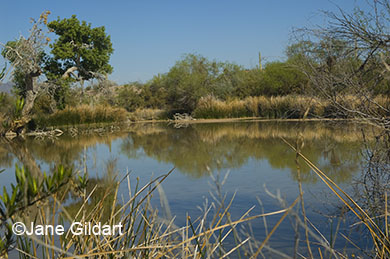
Quitobaquito
Quitobaquito is the right place to reopen first, and for Baiza there may even be a few personal reasons. Baiza recalls when he once worked along the border in the late 1990s. He’d found some downed barbed wire, and some kids from Mexico came over, then an old man. “We all talked and had a very relaxed time. Of course, times are different now, but wouldn’t it be nice to go back to those days?”
WHY QUITOBAQUITO?
Baiza’s reasons, of course, go deeper than pleasant conversation. Bottom line, it has to do with the resource and with we visitors who are entitled by mandates to see those resources. Quitobaquito, then, was the perfect spot.
Historically, the springs provided a watering hole for Native Americans, for Spanish explorers and for the ranchers who later bought the land. Quitobaquito is also where an endangered species of pup fish has carved out a living for thousands of years. And, as we learned from our morning’s trip, it is simply a beautiful area where cotton wood trees grow large and where birds of all descriptions congregate.
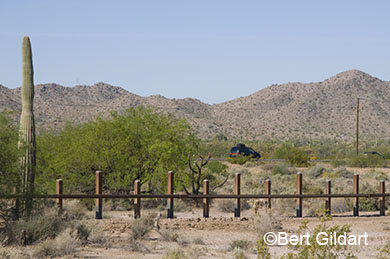
30 mile-long fence helps
It is an area that visitors should be able to see, something with which Mr. Baiza most emphatically agrees. In fact, Baiza, who transferred here last May from Petrified Forest National Park to assume the position of superintendent in Organ Park, so fervently believes that park visitors should see the area that he has pushed forward a trip that may be one of the most unique in North America.
Baiza refers to the original mandates of the national park service, noting they stipulate that the park’s resources must be protected and that they shall be made available to visitors. That is what Baiza is attempting to do, but the manner, of course, is certainly unique. In fact, it may be the only place in the United States where visitors see some of the park’s spectacles accompanied by an armed escort–all preceded by an area patrol.
LEVEL OF PROTECTION
Prior to our departure, the border patrol canvassed the same dirt road our group would later drive–and hike. After assuring the area contained no illegal immigrants, visitors then loaded into a van, and it was flanked by a border patrol and rangers in vehicles who were armed with M-16’s. These are heavy duty guns, used in Vietnam. But this is serious business, and what makes it particularly dramatic is that we weren’t exploring sections of some country that bears us ill will, rather we were exploring one of our own national parks.
“You’ve hit on the reasons,” said Baiza, “when I asked him what would happen if marijuana were legalized and if illegal immigrants were offered work passes. “That’s at the root of our problem, and we hope the fence we’ve just constructed will take care of part of the problem.”
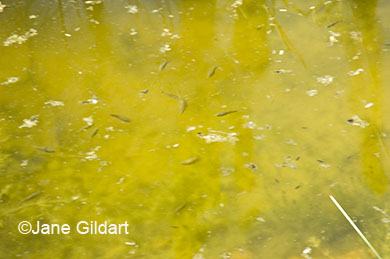
Endangered pup fish
The fence Baiza is referring to now runs along the southern border of Organ Pipe. It parallels Highway Two that also runs parallel to the Organ Pipe border but on the Mexican side. Previously, drug dealers could drive into the park in four-wheel drive vehicles and, then, because the park is so remote, they could easily drive on, thereby conducting their own illegal activities but also leaving tracks in the desert that will require centuries to heal. Baiza hopes the fence will solve part of that problem, and points out that the upright fence posts are sunk deep into the ground and are so close together that a vehicle can not enter. But that doesn’t stop foot traffic, and that’s a problem Baiza hopes will be controlled with increased surveillance. Presently, thousands of illegal use some part of this 30-mile long border each year to gain access into the United States.
Baiza says that he doesn’t know what the future holds, though he is doubtful if visitors will ever be able to make private trips to Quitobaquito as they could prior to 2002, the year drug pushers killed Chris Eggle.
WHAT DOES FUTURE HOLD?
But whatever the future holds, Quitobaquito is certainly worth a visit in whatever manner is deemed necessary. Not only does it contain the beautiful springs, but it also contains the Senita, a cousin to the organ pipe that has unique characteristics and grows nowhere else in the United States except in Organ Pipe.
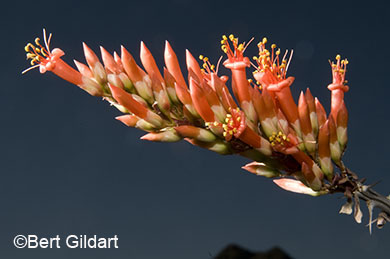
Ocotillo added to day's beauty
The area also contains all the other beautiful examples of the Sonoran Desert, and when we visited, Ocotillo was blooming in profusion. Like all else at Quitobaquito it gladdened our day, and made us appreciative of all the National Park Service is doing to protect the resource and make available those resources to us visitors.
We recommend the trip and believe anyone who has faith in what is probably an overkill of protection, take in the half day adventure–and then write your representatives and let them know you support the park’s efforts. Tell them you hope they will continue to provide the funding necessary to help resolve this national disgrace. Tell them drug lords and illegal immigrants should not dictate visitor access to national treasures.
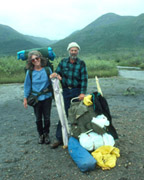

April 4th, 2008 at 1:36 pm
Very interesting post.
When you asked about legalized marijuana and the availability of work permits, were you wondering if the park’s problems would go away if these changes occurred?
Being a fish head, I would have liked to have gotten a closer look at those pupfish. I bet that Quitobaquito is a very interesting landscape.
Did you add any new birds to your list?
February 19th, 2012 at 9:42 pm
While I appreciate the need for the “Nanny State” to protect us from every possible danger I miss the time when we were allowed to accept some danger if we so chose. I suppose we can blame it on the cowardice of bureaucrats who love their jobs and fear losing them if anything happens on their watch as well as our lawsuit crazy society. Why can’t I sign a release form saying I’m an adult, accept the dangers and be allowed to visit the American places I enjoyed seeing 30 years ago? We are allowing ourselves to become a nation of cowards, unable to deal with a world containing some dangers. Whatever happened to “Land of the free, home of the brave”? Let’s grow up. Would Kris Eggle have wanted us to stop going to a beautiful place because some bad people sometimes pass through the area? I think not. Let’s not let the bad guys win.